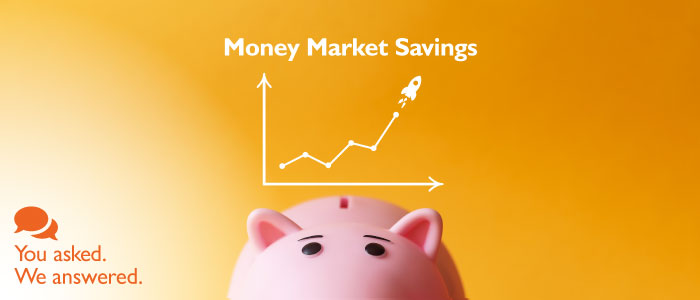
Does a Money Market Make Sense for You?
Savings accounts, CDs, money markets… there are so many savings options, how do you know when a money market makes sense? Here are some basic definitions and details to help you decide what makes the most sense for you as you plan for your financial future.
What Is a Money Market Account?
A money market account is a short-term savings option that offers higher yields than a standard savings account, but greater accessibility to your funds than with a certificate of deposit. A money market account is NCUA-insured, which means there is a reasonable amount of risk.
As a UFCU Member, you can open a money market account with an initial $2,500 deposit. The account must maintain at least that balance, and you’ll earn interest that is compounded and paid monthly.
Give us a call, or stop by your local
branch anytime to open a money market account or chat with a personal financial representative.
Why Choose a Money Market Account?
Money markets are ideal for those who want to save money and rest assured that their money can be accessed without a fee. Think of your money market account as a savings account on steroids — one that combines the advantages of a savings account with the conveniences of a checking account. With a UFCU money market account, you have the ability to write checks or make debit card purchases. You can make unlimited over-the-counter transactions. And, just like a traditional checking or savings account, you can use UFCU Bill Pay to make transactions, transfer funds, and use direct deposit and ATM services.
You can sweeten those earnings even more, earning up to an additional — .05% APY1 over the standard rate — by making at least 10 qualifying checking account transactions each month. They can be scheduled as regular, automatic transfers from your checking account.
How Does a Money Market Compare to Other Accounts?
The best way to determine whether a money market account is the optimal savings vehicle for you is to compare your options. In a nutshell, here’s what to know:
- Like a checking account, money market accounts offer easy access to your funds.
- Unlike a checking or standard savings account, you’ll need to maintain a higher account balance — at least $2,500 — in your money market account.
- Money markets offer more flexibility than a certificate of deposit, with penalty-free access to your funds. However, certificates typically offer higher yields.
The Best Uses for a Money Market Account
Consider a money market for funds that you want to have access to as needed in the near future. That could be for unanticipated emergency expenses, upcoming tax2 payments, next semester’s tuition, or that vacation to Alaska next year. With their relatively easy access and interest-earning features, these accounts are ideally suited for large-ticket items and infrequent expenses.
So, Is a Money Market Right for You?
Everyone has different financial goals. To know if a UFCU money market account is right for you, consider your personal answers to these five questions:
- Can you maintain a minimum balance of $2,500?
- Do you want the ability to have quick access to your funds?
- Is NCUA-insured safety important to you?
- Are you looking to earn higher interest on your money than in a regular savings account?
Money market accounts can be a useful savings tool for the right situation. For short-term savings with reasonable risk, you might be able to benefit from a money market account as you plan for your financial future.
Thank you for your feedback.